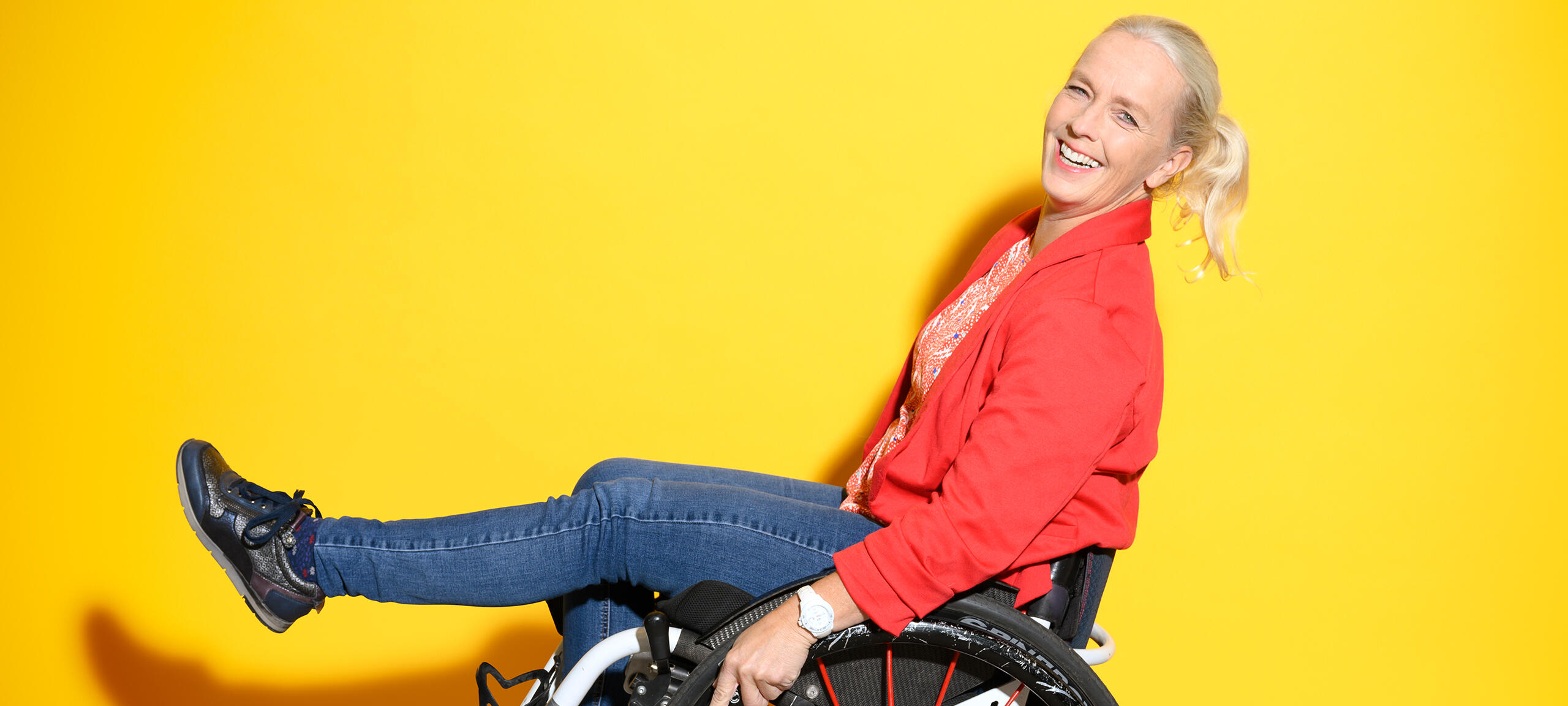
Role model Miranda Kooijman-van der Meer
Who?
Miranda Kooijman-van der Meer (47) from Wilnis worked in the commercial sector from the age of eighteen until she was 26, but a lack of meaning drove her to healthcare. "That didn't come as a surprise to anyone actually. Wanting to help people, that has always been in me. My mother has always worked in healthcare as well." At location VUmc Miranda first worked as a nurse at the ICU and Medium Care and then for 6 years at the endoscopy outpatient department. Since 2019, she has been working as a transfer nurse at location AMC. "This career switch has to do with the fact that I ended up in a wheelchair six years ago. After multiple surgeries due to a worn out knee, I developed all kinds of complications. The cause of that was never really clear. Initially it was thought that I would still be able to walk, but my right leg doesn't want to. In the beginning I still walked partially on crutches, but I can move around better in a wheelchair."
Specialty?
"From Oncology to the Children's Departments, as a transfer nurse I work throughout the whole hospital and it is my job to arrange the care that is still needed for patients who are allowed to leave the hospital. I consult with physicians and nurses about which patients may need follow-up care, and then I visit the patients in person to discuss the care needed after discharge. What is their living and family situation? Are there perhaps people in the vicinity who can provide a share in the care? Sometimes assistance with personal care is sufficient, helping the patient to wash and dress. In other cases, support with temporary extra care is desirable, such as infusion therapy, wound and catheter care or palliative care. We then also arrange the aids and equipment needed at home. And it may also involve a request for a temporary stay in an assisted living facility, nursing home or hospice." Because of corona, her work became more important than ever. "The right care in the right place has never been more important. Every bed is important now. The sooner such a bed is freed up, the better. Of course without losing sight of the patient's best interests."
Why are you committed to healthcare?
"Being able to be there for others is what I enjoy most about my work. You meet people in very vulnerable situations and at that moment I can mean something for them. I find that really special. In the commercial sector I earned a lot more, but I haven't regretted my career switch for one day. I enjoy my work and go home every day feeling satisfied, and that is worth so much more."What does Amsterdam UMC mean to you?
"I don't experience working in a wheelchair as an obstacle, thanks to my colleagues. I am treated like everyone else, I feel at home here. Within Amsterdam UMC I also hope to be an example for other people with disabilities. Just because I am in a wheelchair does not mean I cannot work. Unfortunately, I still see many rollers who do not get a fair chance or who struggle with all the bureaucracy. With them I would like to share my knowledge. And show that a wheelchair does not have to be an obstacle to a career in health care, or anywhere else. I can still fulfill a very beautiful role and practice a rewarding profession. Don't give up, try to look at the possibilities."
Amsterdam UMC is going for diverse and inclusive. Where are the opportunities?
"Inclusion has to be propagated, it has to be visible and you have to really believe in it. When I ended up in that wheelchair, Amsterdam UMC initially looked at what was no longer possible instead of what was still possible. That is where the opportunities lie. Yes, it is a lot of arranging and figuring out, but so much is possible nowadays. I want to think about that, share my knowledge. So that more passionate people like me get to work here. Being a good employer for people with a disability is a area where Amsterdam UMC could use a pinch of Bibian Mentel mentality. Thinking in terms of possibilities instead of limitations."
Outside of working hours?
"Skiing has always been my great passion, so last year I started with seated skiing. I also play wheelchair tennis and make a lot of bicycle trips with the handbike. No, sitting around is not my thing. With her positivity and immense perseverance, Bibian Mentel is a great example for me. Think in terms of possibilities and dare to dream,' she once said to me in the flap text of her autobiography LEEF (live). That is also my motto now."
Do you have any questions for Miranda or would you like to know more about diversity & inclusion within Amsterdam UMC. If so, please email diversiteit@amsterdamumc.nl
Text: Sophie Verschoor
